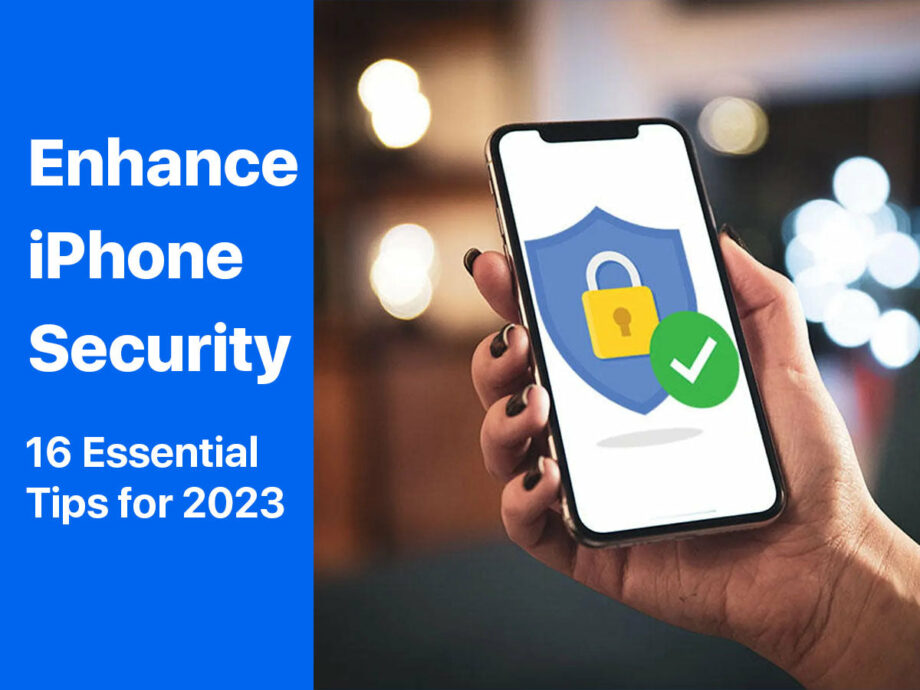In the digital age, where personal and professional data intersect seamlessly with daily smartphone use, bolstering the security of your device is paramount. For iPhone users in 2023, ensuring that your device defends effectively against threats is more critical than ever. Here are 16 essential tips to enhance your iPhone’s security, keeping your digital life both safe and private:
-
Update iOS Regularly: Always keep your iPhone’s operating system updated to the latest version. Apple frequently releases updates that patch known vulnerabilities and provide new security enhancements.
-
Use Strong Alphanumeric Passcodes: Move beyond simple four-digit codes or predictable passwords. Set a strong alphanumeric passcode that combines letters, numbers, and special characters.
-
Enable Two-Factor Authentication (2FA): This adds an extra layer of security by requiring not only a password and username but also something that only the user has on them, i.e., a piece of information only they should know or have immediately to hand – such as a physical token.
-
Opt for Face ID or Touch ID: Utilize Apple’s biometric options to lock your device. Both Face ID and Touch ID provide a secure and convenient way to unlock your phone, approve purchases, and sign into apps.
-
Use Auto-Lock: Ensure your device is set to auto-lock within a minimum amount of time, ideally 30 seconds or less. This limits unauthorized access if your phone is left unattended.
-
Review App Permissions: Regularly check what permissions apps are requesting and only grant what is necessary for the app’s function. Be cautious of apps asking for extensive access to personal information.
-
Disable Lock Screen Notifications: Sensitive information can appear in notifications. Disable lock screen notifications for apps that show personal details or use the ‘show previews when unlocked’ setting.
-
Be Wary of Wi-Fi and Bluetooth: Public Wi-Fi and unidentified Bluetooth connections can be avenues for attacks. Use VPN services when on public Wi-Fi and turn off Bluetooth when not in use.
-
Set Up ‘Find My iPhone’: This feature can help locate your iPhone if lost or stolen, remotely lock it, or erase its data to prevent unauthorized access.
-
Beware of Phishing Scams: Educate yourself on the latest phishing tactics. Always verify the authenticity of requests for personal information and don’t click on unknown links in emails or texts.
-
Use Secure Browsers: Avoid storing sensitive information like passwords and credit card numbers in your browser. Use reputable third-party browsers known for their security features.
-
Encrypt Backups: Use encrypted backups on iTunes for secure data storage or ensure your iCloud security is up to date, taking advantage of the end-to-end encryption.
-
Download Apps from Trusted Sources: Only download apps from the App Store, which vets apps for security standards, unlike third-party sources that can offer malicious software.
-
Logout After Banking Sessions: Always sign out after accessing banking or sensitive account apps. This prevents any accidental access on shared devices or through app vulnerabilities.
-
Secure Sensitive Photos and Files: Use the ‘hidden’ album in Photos or better yet, third-party secure vault apps to store sensitive information and personal photos securely.
- Regularly Audit Device and App Access: Go to Settings > Privacy, where you can see a list of all apps and what data they have access to. Revoke permissions that are unnecessary.
Implementing these steps will substantially strengthen the security of your iPhone in 2023. As digital landscapes evolve, staying informed about the latest security measures and being proactive about implementing them is crucial in protecting your information from new and emerging threats.
